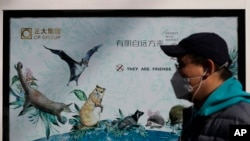Conservation groups are concerned the wildlife trade will be allowed to resume as China begins to ease restrictions on movement and work in areas of the country hit hardest by COVID-19, which could pose a threat to human health.
Scientists say the coronavirus outbreak likely originated through animal-to-human transmission at a wild animal market in Wuhan, and studies by the Global Virome Project, a California-based effort to prevent pandemics, predict about five new animal-borne pathogens will infect humans each year.
The wildlife trade in Asia is big business; China’s annual wildlife trade market is estimated to be worth more than $7 billion, “and this goes up tenfold when you include the business surrounding it,” according to Steve Galster, founder of Freeland, a Bangkok-based environmental conservation and human rights organization.
Most experts are calling for a permanent ban on the trade and consumption of wild animals.
“We’re not talking about banning deer or duck hunting. We’re talking about ending the global commercial trade in wild animals,” Galster said.
“This COVID-19 started in a wildlife market in Wuhan, China. The Chinese know it. That’s why they closed that and every other market across the country and have banned wildlife trade and wildlife consumption,” he said.
Asia’s appetite for pangolins and other wildlife led to several virus outbreaks in the early 2000s including the SARS pandemic and bird flu.
Coronavirus transmission was believed to have occurred from bats to civets and pangolins, whose scales are highly valued in traditional Chinese medicine.
Early COVID-19 infections were found in people who had had exposure to Wuhan’s wet market, where snakes, bats, civets and other wildlife were sold.
China temporarily shut down wildlife markets in January, warning that eating wild animals posed a health and safety threat. The country took similar action in 2003 during the spread of SARS, severe acute respiratory syndrome.
None of the past animal-borne diseases have had the coronavirus’s devastating effect, though.
Dr. Wittaya Reongkovit, a Thai public health officer was working in Bangkok during the SARS outbreak that began in November 2002 and spread to 29 countries, including Thailand.
“This pandemic is spreading faster right now but we also have better and faster communication in the era of big data on a real timeline and that is helping develop our newer biotechnology,” Wittaya said.
“If they can ban the wildlife trade permanently it will be good because many people in Asia like to eat the wildlife meat raw or barely cooked because it is in their tradition,” he said.
“If you cook and clean the meat properly it is much safer but people in the poorer areas of Asia are without access to proper hygiene and nutrition.”
As China continues easing restrictions in former COVID-19 hotbeds, conservation groups say they will continue applying pressure to ban wildlife trade and the deadly viruses that come with it.
“There are divisions within the Chinese government now on whether to keep a strict ban, or eventually loosen it up,” Galster said.
“If we don’t treat the cause of this mess, current efforts will amount to expensive Band-Aids the that need frequent changing,” adds Galster.






